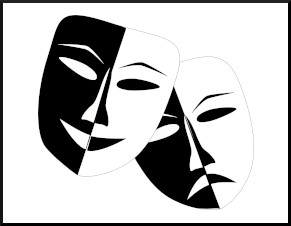Thomas Hardy? John Ruskin? William Stearns Davis? Apocryphal?

Question for Quote Investigator: Comedy and tragedy are sometimes intertwined. The prominent English novelist Thomas Hardy has received credit for the following remark:
Comedy is tragedy, if you only look deep enough.
This statement has also been ascribed to the influential English art critic John Ruskin. Would you please explore this topic?
Reply from Quote Investigator: The earliest match known to QI appeared in a letter Thomas Hardy sent to John Addington Symonds in 1889. Boldface added to excerpts by QI:1
I often begin a story with the intention of making it brighter & gayer than usual; but the question of conscience soon comes in; & it does not seem right, even in novels, to wilfully belie one’s own views. All comedy, is tragedy, if you only look deep enough into it.
Below are additional selected citations in chronological order.
In 1900 a thematically related remark appeared in the novel “A Friend of Caesar: A Tale of the Fall of the Roman Republic” by William Stearns Davis:2
All comedy is tragedy, and at its merriest is but dolorous stuff. While the curtain stays down we are sorry actors with the whole world for our audience, and the hoots mingle full often with the applause.
In 1910 “The Times” of London reported that Thomas Hardy was honored with “The Freedom of the Borough of Dorchester”. He delivered a speech that included a slightly more compact version of the remark under examination. Interestingly, he credited John Ruskin although he also expressed some uncertainty:3
I will detain you no longer from Mr. Evans’s comedy that is about to be played downstairs. Ruskin somewhere says that comedy is tragedy if you only look deep enough. Well, that is a thought to remember; but to-night, at any rate, we will all be young and not look too deeply.
In 1928 Thomas Hardy penned a reminiscence about his friend George Meredith, and he employed the remark again:4
I am not able to say what influence Meredith may be exercising over the writings of the present generation. Some of his later contemporaries and immediate successors certainly bear marks of his style and outlook, particularly in respect of The Comic Spirit, most of them forgetting, as he did not forget (though he often conveniently veiled his perception of it), that, as I think Ruskin remarks, “Comedy is Tragedy if you only look deep enough.”
The text above is from “Thomas Hardy’s Personal Writings” edited by Harold Orel in 1966. The footnote accompanying the text points to the following letter by John Ruskin as a possible explanation for why Hardy ascribes the remark under examination to Ruskin:5
The reference is to Letter 82 (October, 1877) of Fors Clavigera, in Ruskin’s Works, edited by E. T. Cook and Alexander Wedderburn (London, 1907), VII, 233-235.
QI examined this letter, and Ruskin did discuss comedy and tragedy, but the missive contained no solid match for the quotation in QI’s opinion. The reader may wish to personally examine Ruskin’s letter. Here is a link to the sole occurrence of the word “comedy” in the volume.
QI has written an article about a thematically related saying. The television personality Steve Allen penned the following adage in February 1957: Tragedy plus time equals comedy. More information on this topic is available here.
In 1994 “The Age” newspaper of Melbourne, Australia published a review of a book about Thomas Hardy and printed the quotation:6
And Hardy had a profound sense of humor, as active in his novels as in his poetry. “All comedy,” he wrote, “is tragedy, if you only look deep enough into it.”
In conclusion, QI believes that Thomas Hardy should receive credit for the statement he wrote in 1889. Hardy may have been inspired by the words of John Ruskin, but there is no substantive evidence that he lifted the remark from Ruskin.
Image Notes: Illustration of masks depicting comedy and tragedy from Clker-Free-Vector-Images at Pixabay. Image has been resized and retouched.
Acknowledgement: Many thanks to Gregory Tate who located the remark in the 1889 letter and mentioned it in a tweet. Thanks also to Greg Priest who noted the thematic connection to “Comedy equals tragedy plus time”. In addition, thanks to Jeremy Marchant for his comments.
Update History: On March 30, 2025 the format of the bibliographical notes was updated.
- 1978, The Collected Letters of Thomas Hardy, Volume 1, 1840-1892, Edited by Richard Little Purdy and Michael Millgate, Letter date: April 14, 1889, Letter from: Thomas Hardy, Letter to: John Addington Symonds, Location: Max Gate, Near Dorchester, Quote Page 190, Oxford University Press, Oxford, England. (Verified with scans) ↩︎
- 1900, A Friend of Caesar: A Tale of the Fall of the Roman Republic by William Stearns Davis, Chapter 11: The Great Proconsul, Quote Page 206, The Macmillan Company, New York. (HathiTrust Full View) link ↩︎
- 1910 November 17, The Times, Dorchester and Mr. Thomas Hardy, Quote Page 12, Column 3, London, England. (Newspapers_com) ↩︎
- 1966, Thomas Hardy’s Personal Writings: Prefaces, Literary Opinions, Reminiscences, Edited by Harold Orel, Part 3: On Literary Matters, Section: G. M.: A Reminiscence (Description: A Reminiscence about George Meredith), Original Publication Data: (Nineteenth Century and After, February, 1928, pp. 146-148), Start Page 151, Quote Page 154, University of Kansas Press, Lawrence, Kansas. (Verified with scans) ↩︎
- 1966, Thomas Hardy’s Personal Writings: Prefaces, Literary Opinions, Reminiscences, Edited by Harold Orel, Section: Notes, (Note Number 40), Quote Page 274, University of Kansas Press, Lawrence, Kansas.(Verified with scans) ↩︎
- 1994 July 2, The Age, Section: Saturday Extra, Hardy worship by Peter Porter (Book review of “Hardy” by Martin Seymour-Smith), Quote Page 7, Column 4, Melbourne, Victoria, Australia. (Newspapers_com) ↩︎